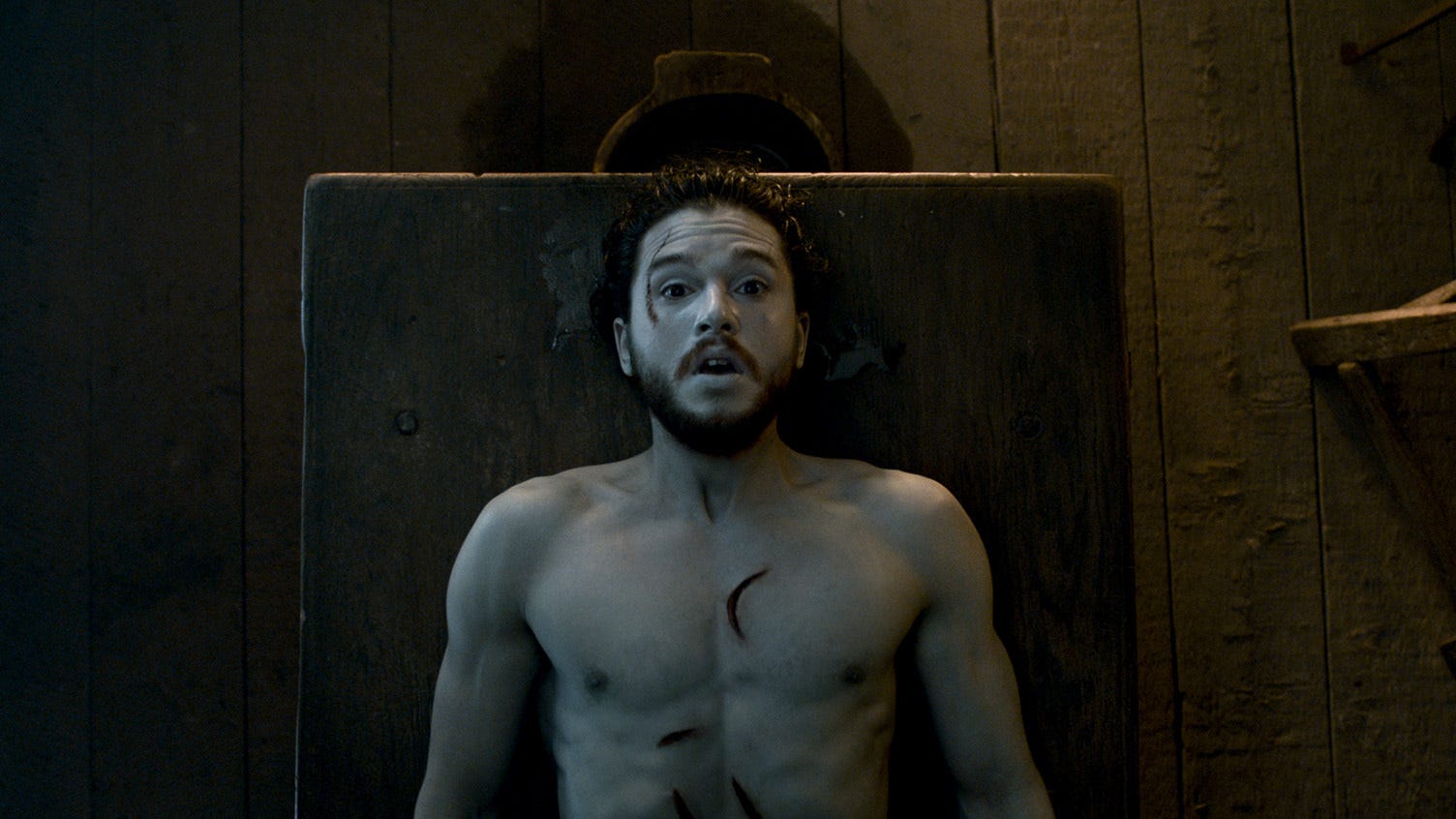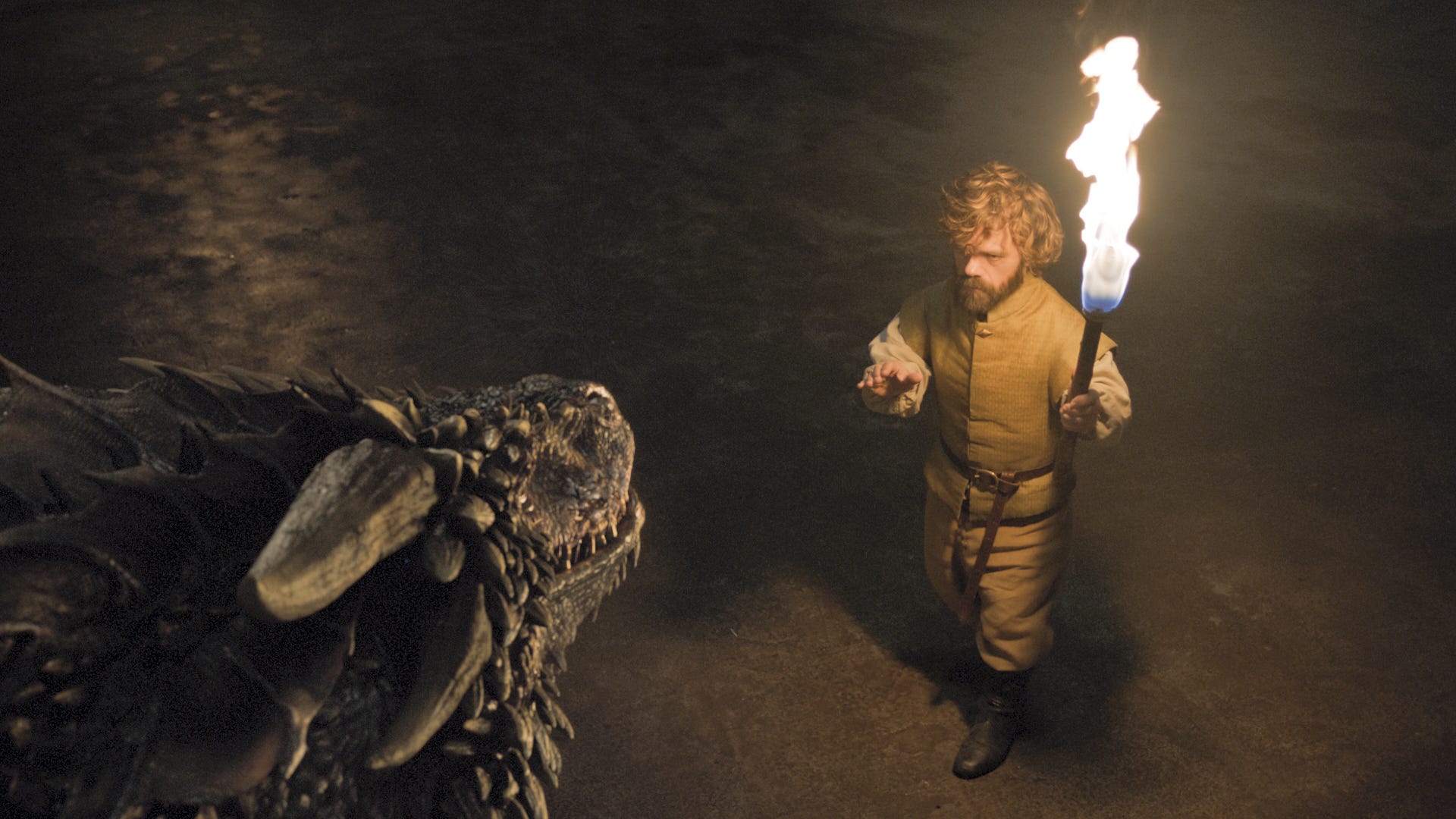Join or Sign In
Sign in to customize your TV listings
By joining TV Guide, you agree to our Terms of Use and acknowledge the data practices in our Privacy Policy.
With Every Shocking Moment, Game of Thrones Loses What Made It Special
What isn't dead yet still may die
[Warning: Spoilers for Season 6, Episode 2 ofGame of Thrones titled "Home," past this point!]
On the most recent episode of HBO's Game of Thrones, Jon Snow (Kit Harington) returned! Tyrion (Peter Dinklage) faced dragons! Theon (Alfie Allen) got his figurative balls back! And Ramsay (Iwan Rheon) killed his dad and fed his stepmom and infant brother to some dogs!
... So why did the hour feel so empty?
To clarify, during the first two episodes of Game of Thrones' sixth season, a lot of "stuff" has happened. There's been shocking moment, after shocking moment... but what has been missing is the emotional weight of the events. Sure, it was nice that the long, exhausting journey towards Jon Snow's resurrection is finally over, but that's a meta-textual reaction to the real-world events surrounding the death, not an emotional reaction to the death (and rebirth) itself.
The issue is that after five seasons and change, Game of Thrones is starting to feel like it's going through the same old cycle of shock, rinse, repeat. When you have one of your main villains kill three people in under 10 minutes, including feeding two of them (one a baby) to hungry dogs, and the main reaction viewers have is, "makes sense..." Something is broken.
There are two solutions to fixing the situation, though, so let's get into it.
Solution No. 1: Let the Characters Breathe

Particularly this season it's felt -- more than usual -- like Game of Thrones is the Westerosi News. Let's check in with Arya (Maisie Williams) as she whacks people with a stick! What's up with Daenerys (Emilia Clarke), is she still wandering and dirty? How about Jon Snow, still dead? No? Cool.
This isn't anything new. Game of Thrones has been running this format since the first season, but this year, it's even more pronounced than usual: the show has become so used to spanning the globe and checking in with everyone that one of the main characters, Bran Stark (Isaac Hempstead Wright), got a new power this year, which is... checking in on what's going on with everyone.
Look, the show hasn't shirked on shocking developments, from the aforementioned resurrection, to plenty of dragon CGI, to Melisandre's (Carice van Houten) old woman reveal (shocker: she's an old woman). But in the effort to traverse the Seven Kingdoms and make sure we touch on every possible character for brief spans of time, we're missing one major element that made the first five seasons special: everyone sitting around and talking.
Yes, Red Wedding-style moments and conspiracy theories are what get fans running to Twitter after the show airs. But what keeps us coming back episode after episode isn't just the chance to watch actors die in increasingly gross ways, it's the chance to watch a few master thespians sit down and tell engrossing, emotionally involving stories.
Watching Tyrion and Catelyn (Michelle Fairley) talk in Season 1, or Arya and Tywin's (Charles Dance) scenes in Season 2 were the true pleasure of Game of Thrones. Seeing how mortal enemies would bond, parry, match wits, or just tell each other basic truths about themselves -- these are the moments where the show really shined.
"Home" had one great example of this. In between all the dragon CGI, and mortal danger Tyrion put himself in while freeing said dragons, there was a moment of true emotion. The "half-man" delivers a monologue to the fire-breathers about how, since he was a little child, he had always wanted to see a dragon; but was told they were extinct. That night, as a young boy, Tyrion cried himself to sleep.
As the littlest Lannister slowly walks his way towards the creatures, he tentatively reaches out his hand, talking all the way... until he touches the dragon's scales. He pauses, he looks down, overcome with emotion. And then he frees them.
That, more than anything else that happened in the hour -- and honestly, the first hour of the season, as well -- is the sort of real, raw emotion that has been missing from Game of Thrones for a good long while. It's so basic, but what keeps us coming back to any TV show at length isn't going to be just the plot, or the spectacle: it's the characters, stupid.
So, take more time. Show fewer characters. And let those characters breathe and interact when you do. Exposition through character and stories; not explosition, or sexposition.
Solution No. 2: Free the Show From Its Format

Back in Season 4, The Walking Dead had hit a rut (bear with me here, we're getting to something). Actually, if we're being honest, the show had hit a rut after the pilot, when it got stuck in an endless cycle of zombie attacks, humans doing horrible things to each other, characters constantly launching into long discussions of what their lives were like now in the post-apocalypse, and who truly were the monsters.
It was really, really boring.
Then halfway through Season 4, newish showrunner Scott Gimple managed to purge most of the storylines left over from previous seasons, and forge his own path. We still got the over-the-top zombie kills, people were still horrible to each other, and it was still up for debate who the true monsters were.
But after a major attack on their prison stronghold/home in the midseason finale, the main characters were scattered apart... and it was exactly the sort of jolt Walking Dead needed to change up the formula.
The episodes broadcast after this event shook up the structure, focusing on just three (or sometimes fewer) characters over an entire hour. Visually, episodes would be tackled differently. Some episodes would even take place time-wise before the episodes that had been broadcast previously.
They experimented. They tried things. They got away from the blueprint. And arguably, Seasons 5 and 6 -- which also played with presentation and time -- are the best the show has ever broadcast.
Game of Thrones never had that early lag The Walking Dead did, and that might be part of the problem. Like a lot of HBO shows, Thrones knew what it was, and came out of the gate confident with the very first episode. Sure, things got shaken up by the death of Ned Stark (Sean Bean), ostensibly the lead character on the show, at the end of Season 1. But over the past half a decade, Game of Thrones has trucked on with the same formula, the same look, the same format.
We've gotten some change here and there, mostly when it comes to major battle episodes like "Blackwater" and "Hardhome," or the intense emotional trauma of the Red Wedding, easily the high/lowlight of both the show and the books.
But every episode of Game of Thrones is starting to feel the same. Without a different style or format in the mix, watching the show is starting to feel like a steady march. It's stylistically consistent, but there's only so long you can watch the same sort of thing, no matter how exciting, without it getting to feel like a steady drone.
Wouldn't it have been nice (or at least emotionally rewarding), as many fans have argued, if we had spent more than five minutes at a time with Sansa Stark (Sophie Turner) after she was repeatedly raped by her husband Ramsay last season? Wouldn't it be great if the next episode was nothing but Jon Snow dealing with being dead and coming back to life, what that means for the Night's Watch and the future of the realm?
Instead, viewers don't get that time to rest, reflect and watch our characters grow. We're on to the next horror, the next spectacular vista, the next plot move that takes our human chess pieces and gets them into position for the final gambit.
There are eight more episodes this season, and then reportedly 13 episodes after that. Chances are our characters are going to be slowly coming together for an epic ending (unless something has gone horribly wrong in the planning stages), so the Westerosi News style of storytelling will make less and less sense. Even with that in mind, I'm sincerely doubtful that tone, that visual style, that pacing will change, even as we get towards the endgame.
At this point, though, is Game of Thrones past its peak? Is it too late to change things? This is not a show that has ever been particularly interested in course-correcting; instead, content to barrel ahead at full(ish) speed towards its conclusion. Thrones, and the men who create the show, have never "given in" or seemed overly bothered by fan complaints, knowing those same fans will tune in to the next episode and the next season. That's, of course, what the HBO subscription model allows: freedom to create without having to worry about advertiser pressure, or in many cases weekly ratings -- for better, or worse.
So Game of Thrones is headed towards its end regardless of what anyone thinks, and will truck ahead with the plot and characters on its own terms, same as it ever was. But my fondest hope is that some time before the Night's King faces off with Jon Snow, Daenerys and the united Seven Kingdoms on the steps of King's Landing, we get more of those increasingly rare moments of character and reflection that made the show special to begin with.
Only then will we get the true payoff, and the sense that the journey following these characters was worth it. Otherwise, we might as well let the White Walkers win and wipe the slate clean.
Game of Thrones airs Sundays at 9/8c on HBO.
